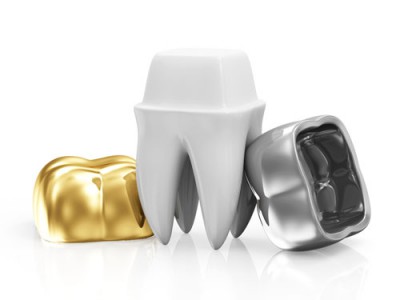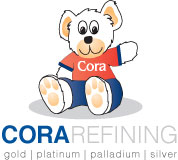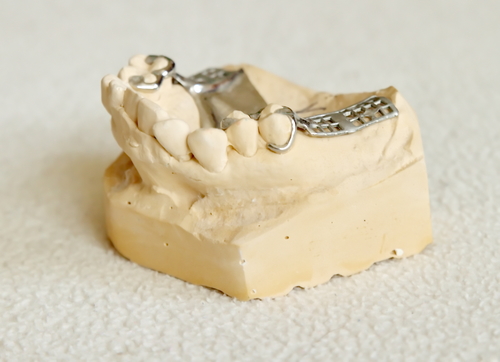At Cora Refining we are ever mindful of our clients’ needs. We stay involved in the dental industry by staying up to date in research and current standards as well as attending trade shows. We know that in the dental industry you have many choices as to what materials are used in dental procedures, such as implanting dental crowns or bridges in a patient’s mouth. Below we have discussed some common materials used in these types of procedures as well as listing the advantages and disadvantages of their use.

Porcelain Crowns and Bridges
Porcelain crowns are a top choice of patients, however, perhaps not dentists, as the disadvantages may outweigh the advantages.
| Advantages | Disadvantages |
|---|---|
| Aesthetic appeal: the porcelain imitates the natural tooth very well and the restored tooth is often unnoticed as different from others. However, if the fit is not right the look may be negatively impacted as well. | The more prominent disadvantage to all-porcelain crowns is their fragility. All-porcelain crowns are even known to chip or crack. |
| There is no dark line present as with some porcelain-fused-to-metal crowns. | In order to make the crown more durable the only option when using all-porcelain is to remove more of the original tooth. |
| Non-allergic: porcelain is very unlikely to cause an allergic reaction in a patient and therefore may be the best choice is the patient has many allergies. | Hypersensitivity to cold and hot is common in patients will all-porcelain crowns, as well as damage caused by these extreme temperatures. |
| Unlike many other procedures that may require two or more visits, porcelain crowns can be installed in just 20-30 minutes. | Bad fit is a possibility with an all-porcelain crown as it is not as malleable a material as metal, especially gold, for instance, and so may not fit comfortably in the patent’s mouth. This can be uncomfortable as well as negatively impact the aesthetics if the fit is noticeably off against the gum line or other teeth. |
Porcelain Fused to Metal Crowns are the Top Choice of Dentists and Patients
Porcelain-fused-to-metal crowns (also known as PFM crowns) or porcelain-fused-to-metal bridges are a preferred choice of dentists and patients.
| Advantages | Disadvantages |
|---|---|
| Aesthetic appeal of a crown is very important; and porcelain gives a smooth, natural, look to the restored tooth. | As mentioned above, a dark line can be noticeable between the metal and porcelain, which some patients dislike.However, this can be avoided if certain metals are chosen, such as a Captek metal-gold composite. |
| By fusing metal to the porcelain the patient receives the benefit of the porcelain aesthetics coupled with the benefits of strength and longevity that metal offers. | Holds the same disadvantages as porcelain cracking etc. as the tooth is still subject to these damages through biting hard objects or playing sports. |
| Better fit can be established with the malleable metal base. | |
| The dark line of some metals fused to porcelain can be avoided if the dentist uses a new composite called Captek, which is a metal gold composite. |
Zirconia Crowns and Bridges
Zirconia crowns are made of zirconium, which is a very strong material. However, there are still many disadvantages as well as advantages you should be aware of with this substance.
| Advantages | Disadvantages |
|---|---|
| The most prominent advantage is durability. Zirconium is extremely strong, much stronger than porcelain. | The main disadvantage to using zirconia crowns is the lack of long-term studies on it. This means that dentists and patients may run into many problems down the line that were unforeseen when they initially elected to use the crown for their tooth restoration. |
| The appearance of these crowns is more aesthetically appealing, because of the color which is similar to natural teeth, as well as the ability of the dentist to modify its size to more seamlessly arrange it beside the patient’s natural teeth. | While the strength of zirconia is perhaps an advantage during wear, it is a severe disadvantage when it needs to be removed or adjusted. It is very difficult to do either of these things for a patient with a zirconia crown. |
| Like porcelain, zirconia may be less of an allergic substance than certain metals that can be used. However, long term testing has not been done and therefore it is not scientifically accurate to label this as an “allergic-free” substance just yet. | Tooth decay below the crown has occurred and is a very real risk that comes with the implantation of this crown. |
Cora Refining is one of the leading refineries of precious metal dental scrap in the industry. Top rated for customer service and quality of craftsmanship, we offer our customers something more when they choose to use us as their dental scrap refinery. At the bottom line of all of our technical advances and transparencies in processing is getting you more cash for your dental scraps.
Contact us today to discuss your options for making money off of your dental scraps. Get cash for dental crowns, sell your dental bridges, and get the top dollar for all precious metal dental scrap!

